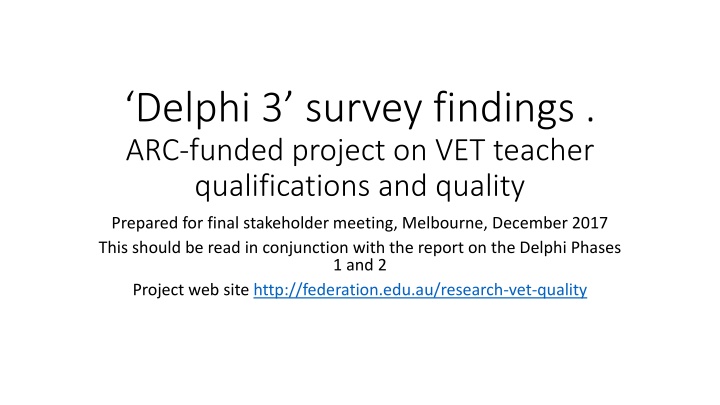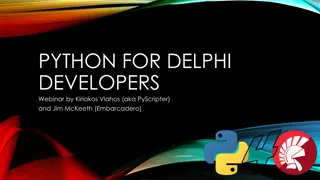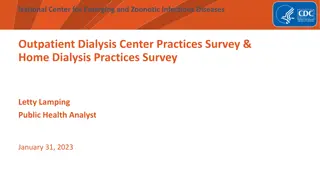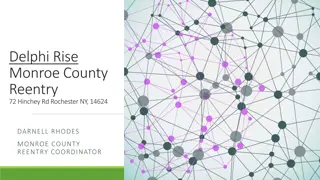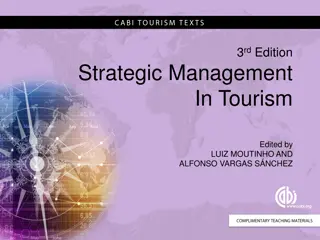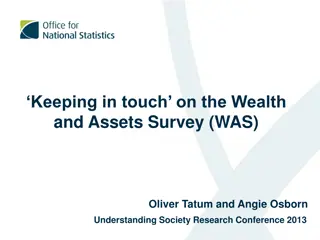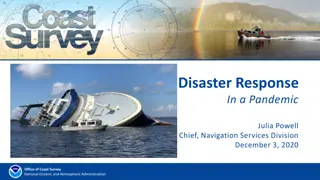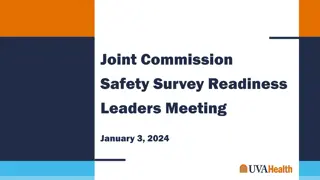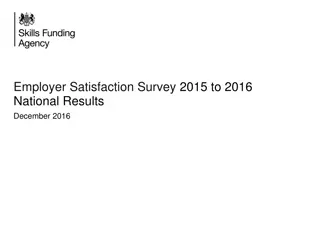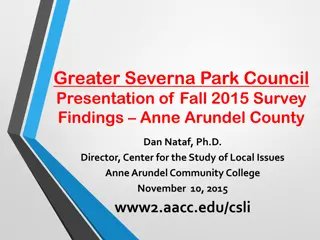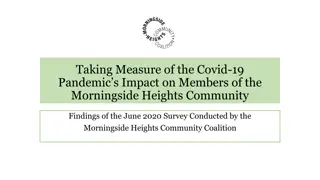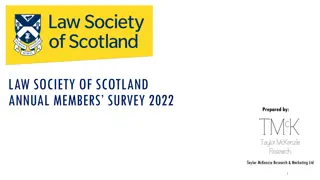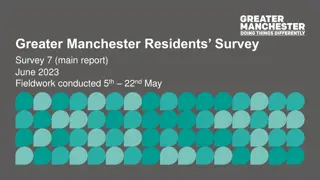‘Delphi 3’ survey findings .
This report presents findings from an ARC-funded project focusing on VET teacher qualifications and quality. It explores key findings related to the impact of higher level qualifications on teaching approaches, confidence, and ability to address diversity in VET contexts. The report also highlights the importance of formal and informal professional development in enhancing teaching practices.
Download Presentation

Please find below an Image/Link to download the presentation.
The content on the website is provided AS IS for your information and personal use only. It may not be sold, licensed, or shared on other websites without obtaining consent from the author.If you encounter any issues during the download, it is possible that the publisher has removed the file from their server.
You are allowed to download the files provided on this website for personal or commercial use, subject to the condition that they are used lawfully. All files are the property of their respective owners.
The content on the website is provided AS IS for your information and personal use only. It may not be sold, licensed, or shared on other websites without obtaining consent from the author.
E N D
Presentation Transcript
Delphi 3 survey findings . ARC-funded project on VET teacher qualifications and quality Prepared for final stakeholder meeting, Melbourne, December 2017 This should be read in conjunction with the report on the Delphi Phases 1 and 2 Project web site http://federation.edu.au/research-vet-quality
Delphi phase of the project This phase examines policy and implementation issues, drawn out through a Delphi process with over 70 experts . Each expert is surveyed three times. Its aim is to uncover (Stream 1 experts, n=35) the national policy national VET teacher workforce development implications of the findings; and (Stream 2 experts, n=34) institutional-level implications. In Round 1 we presented the findings of the main part of the project and asked a number of questions about whether the findings seemed credible, how they would be received in the sector, and about the implications. Round 2 sought feedback on the findings about professional development, and feedback on the responses in Round 1. Round 3 summarised the results of the Delphi 2 survey and asked some questions which delved more deeply into the implications of the project findings and the reactions of the Delphi experts.
Delphi participants 3 phases Invitation list of 55 constructed via recommendations & with assistance of peak bodies and government This slide shows the numbers who responded to Delphi 1 RTO CEO stream Policy stream Type No. Type No. Government/regulatory body 9 TAFE/ dual-sector uni 12 Peak body VET/adult ed 7 Private RTO 5 Individual expert 6 Community college 4 Skills Service Organisation 2 Enterprise RTO 4 Other organisation 1 Total 25 Total 25
Delphi 3 survey: Responses and validation Responses Policy stream: Individual experts 7; government/regulatory body 4; Skills Service Organisations (SSOs) 3; Peak body VET-2, n=16 (46%) Registered Training Organisation (RTO) stream: TAFE 7; Private RTO 3; Enterprise RTO 3; Community college - 2. n=14 (41%) Proportion that would have expected, or partly expected, the proportion of Delphi 2 respondents who said they would take action on the key findings: Policy stream 81%; RTO stream 80%
Key findings of the project as a whole Key Finding 1: Higher level qualifications in VET pedagogy improve teaching approaches, confidence and ability to address diversity in contexts, learners and AQF level of teaching. Key Finding 2: VET teachers often have high level qualifications in their industry area or other disciplines and these too improve teaching approaches, confidence and ability to address diversity in contexts, learners and AQF level of teaching. Key Finding 3: Higher level qualifications in VET pedagogy make a significant difference to VET teachers confidence in teaching a diversity of learners. Key Finding 4: The key qualification level that makes a difference is a degree. Key Finding 5: Participation in both formal and informal PD, in both industry/discipline and VET teaching/training increases with higher qualifications, irrespective of the type of qualification. Key Finding 6: VET teaching/training PD should be tailored for teachers with higher levels of VET pedagogy qualifications
Delphi 3 findings on Main barriers on Key Findings 1-4 barriers to actions Items nominated as significant barriers by over 55% of each stream (in order): Most significant are in red font. Policy stream: Extra cost; need for culture change; need to change policy, incentives and funding settings; resistance to more change; need to show return on investment. RTO stream: teachers ability to undertake quals as well as maintain industry currency; need to change policy, incentives and funding settings; Need to improve/tailor degree qualifications in VET teaching; extra cost.
Main facilitators facilitators for actions on Key Findings 5-6 Items nominated as potential significant facilitators by over 55% of the stream (in order): Most significant in red font Policy stream: national standards/frameworks for PD/prof. assn. RTOs to develop PD strategy; career pathways/incentives linked to PD; employers to provide time release for PD; VET teachers to take more responsibility; good on-line resources available for RTOs to use in PD. RTO stream: Funding might only need initial funding from Commonwealth. ( Most votes for most significant went to national standards/frameworks for PD/prof. assn. )
How difficult would it be to require new recruits the Diploma of VET or a degree in VET pedagogy? new recruits to have or acquire or acquire Policy stream RTO stream Very difficult Quite difficult Relatively easy Very difficult Quite difficult Relatively easy 0.0% 50.0% 50.0% 57.1% 21.4% 21.4% Diploma of VET Diploma of VET 25.0% 43.8% 31.3% 71.4% 28.6% 0.0% Degree in VET pedagogy Degree in VET pedagogy
How difficult would it be to require existing VET teachers acquire acquire the Diploma of VET or a degree in VET pedagogy? existing VET teachers to have or or Policy stream RTO stream Very difficult Quite difficult Relatively easy Very difficu lt 35.7% Quite difficult Relatively easy 6.3% 37.5% 56.3% 57.1% 7.1% Diploma of VET Diploma of VET 37.5% 43.8% 18.8% 78.6% 21.4% 0.0% Degree in VET pedagogy Degree in VET pedagogy
Could the Cert IV TAE or Dip VET be a traineeship? Cert IV TAE Policy stream Yes 6; Maybe 7; No 3 Dip VET Policy stream Yes 7; Maybe 7; No 2 RTO stream Yes 6; Maybe 5; No 3 RTO stream Yes 4; Maybe 6; No 4
